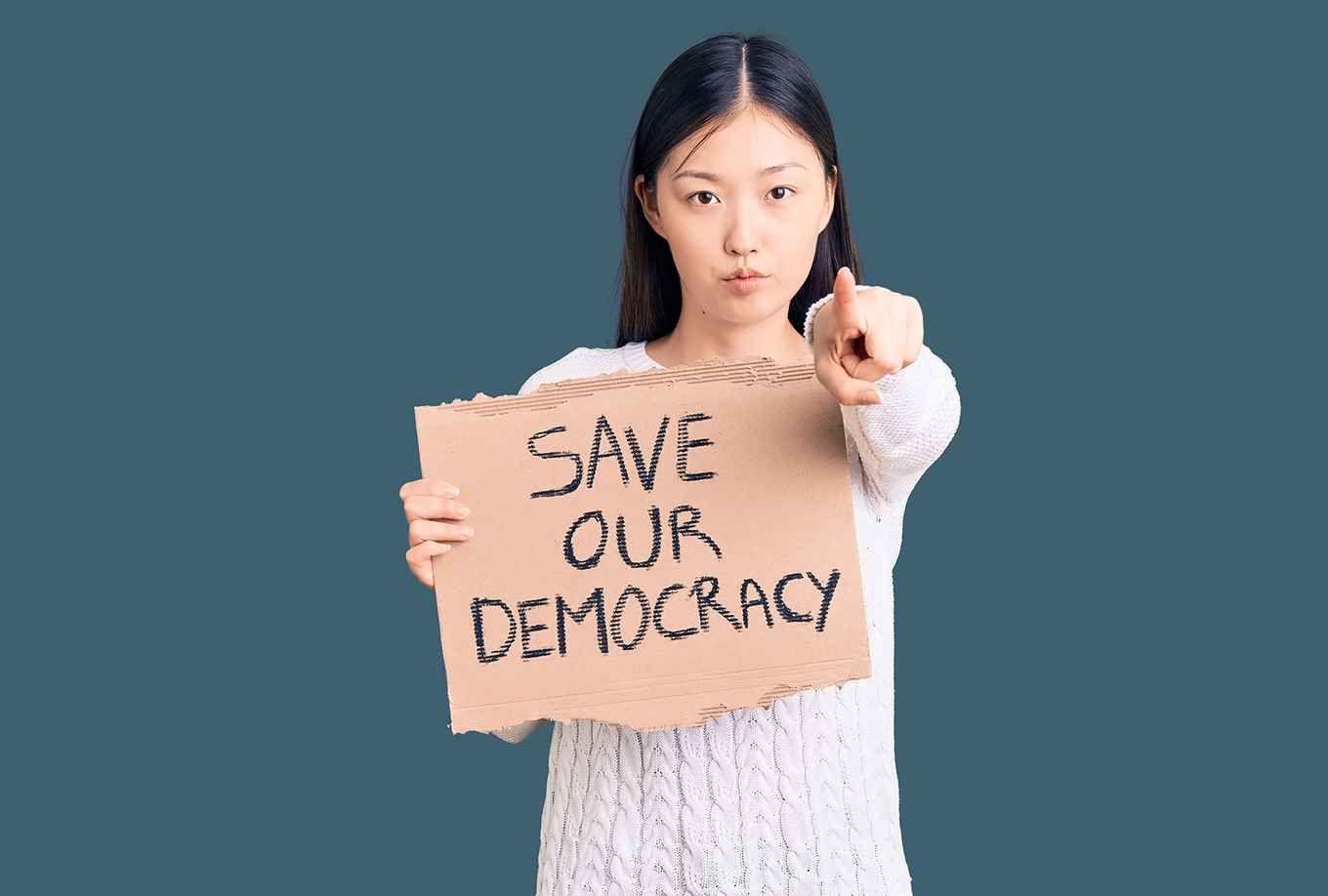‘A growing number of citizens is immune to the authoritarian virus’
9 February 2021

Academics, politicians and citizens are sounding the alarm about the erosion of democracy. Democratic values are declining, democratic institutions weakening and ever more leaders all over the world are showing authoritarian traits. Just like virologists, political scientists are researching how the authoritarian virus is spreading and how it influences people in their political views.
Political scientist Sjifra de Leeuw took this perspective as well, viewing these developments as a virus that goes around and can infect people. But, she reasoned, just as with a real virus, there’s also a good chance that people can develop immunity after encountering this virus. De Leeuw translated the virus into the images of life in authoritarian regimes that people see through newspapers, TV and other media. She researched how these images affect their political views. Do they get infected and does this make their views less democratic? Or do people develop immunity and is their support for democracy actually strengthened after seeing authoritarian images?
‘The symptoms of immunity are much more dominant and durable than the symptoms of infection’, concludes De Leeuw. ‘Irrespective of the country and time, democratic values are strengthened among a substantial number of citizens after they are exposed to images of authoritarian regimes. They are the protectors of democracy.’
More support for democratic beliefs
To start with, De Leeuw studied how images of life under authoritarian regimes influences citizens’ ideological and democratic beliefs. Does this encourage citizens to support the standpoints of authoritarian regimes, especially citizens who live in countries with an authoritarian past? De Leeuw found the answer to this question using survey data from 105,495 citizens in 38 European countries, including countries both with and without an authoritarian past.
Citizens in previously authoritarian countries appear to support the beliefs of authoritarian regimes more than citizens in other countries. But at the same time democratic values of many other citizens in the same countries seem to be strengthened by the past. They massively support the opposing values, which they associate with pro-democratic resistance. Support for authoritarian beliefs furthermore weakened in following generations, while the support for opposing convictions increased among new generations.
More support for strong measures to protect democracy
Secondly, De Leeuw researched citizens’ support for strong measures to protect democracy against its enemies. Does this support weaken after citizens are exposed more to images of authoritarian government? Working on the basis of survey data from 195,405 citizens in 27 European countries, De Leeuw concludes that citizens in formerly authoritarian countries support such measures just as strongly as citizens in other countries. This applies particularly to countries with a more distant authoritarian past and the support increases as older generations make way for younger generations.
News media confer immunity
So that’s a positive message: immunity to authoritarian virus grows with new generations and hence resistance to authoritarian practices. But, and this is possibly the most important question, where does this resistance come from? ‘News media play an important role in this’, argues De Leeuw. ‘They teach citizens to recognise possible dangers to democracy by drawing attention to these in time.’
In order to chart the role of news media, De Leeuw conducted a third study in which she analysed 27,830 articles about the former American President Donald Trump, taken from 35 different newspapers in 12 Western countries. Specifically, she examined how often Trump was explicitly presented as a threat to democracy and democratic values by depicting him as a ‘dictator’, ‘sexist’ or ‘racist’ (or similar epithets).
De Leeuw observes that news media in all 12 of the countries continually categorise Trump as an authoritarian personality, especially the media in countries with an authoritarian past. ‘Hence news media in these countries show symptoms of immunity to the authoritarian virus and transmit this to the citizens.’
Contact with highly repressive regimes is punished
And lastly, De Leeuw examined how citizens in the US rate the actions of their president and how this is influenced by viewing authoritarian images, specifically of regimes with which the US has strong economic or political ties. To this end, she compiled and analysed 9,862,251 articles from the period 1947-2019. Here De Leeuw encountered symptoms of infection: American citizens reward their president for cultivating ties with allied autocracies; but symptoms of immunity appear to be stronger: citizens withdraw their support when their president maintains contacts with highly repressive regimes.
Casting new light on the consequences of the authoritarian virus
‘These findings cast new light on the consequences of the authoritarian virus’, concludes De Leeuw. ‘Some of my findings confirm the pessimism of earlier research, namely that exposure to authoritarian images weakens democratic support among some citizens in some countries. But this effect itself then weakens, and it seems that symptoms of immunity are ultimately much more dominant and durable than the symptoms of infection. Irrespective of the time and place, increased exposure to authoritarian regimes strengthens democratic values among a substantial number of citizens as well as their support for strong measures to protect these values.’
PhD details
Sjifra de Leeuw: The Authoritarian Virus: Between Infection and Immunity An Empirical Investigation of Authoritarian Framing Effects in 42 Democracies, Doctoral thesis supervisor: Prof. Joost van Spanje., co-supervisors: Dr R. Azrout en Dr R.S.B. Rekker.
Time and location
Sjifra de Leeuw's doctorate conferral will take place online on 12 Februari 2021 at 11.00. Find more details on the live link